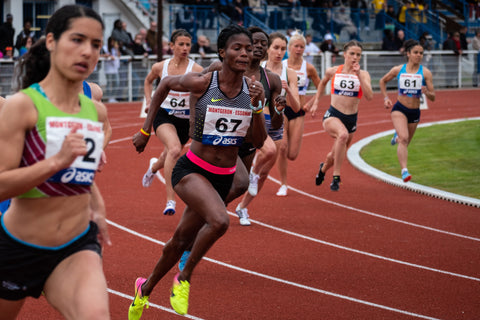Racing for equality: The discrimination of female athletes

It’s 2021 and the policing of women’s bodies is a practice that continues to thrive. At the Tokyo 2020 Olympics, it was clear that even in the very public and global eye, we still fail to leave behind sexist double standards and racists measures.
The Tokyo 2020 Olympics were proudly presented to the public as the first “gender-equal Olympic Games ever”. The argument was that there would be nearly the same number of male and female athletes and a sporting schedule that would give equal amounts of visibility to both men’s and women’s events during primetime hours. The International Olympic Committee (IOC) even went so far as to say that this year’s Games constitute a “landmark in gender equality”. Oh, how we so wish that this was true.
From the sexualization and policing of testosterone levels to the Norwegian women’s beach handball team being fined because their shorts were too long, discrimination remains omnipresent in the world of sports.
Double Standards
Not only was the Norwegian women’s beach handball team fined 1,500€ because their shorts were too long, but British Paralympian Oliva Breen was told by an official ahead of the 2020 games that her briefs were too short. The Paralympian confirmed that her briefs were within the dress code set by the Olympics which allows athletes in her department to wear sponsored gear (the briefs), as long as they also wear a vest or a national kit. Their outfits cannot be “objectionable or see-through”.
And although handball wasn’t part of the 2021 Tokyo Olympics, this incident remains a stark reminder of the flagrant sexist double standards that athletes are facing every day.
Sexist ideas also plagued the IOC’s regulations on testosterone. Namibian track and field stars Christine Mboma and Beatrice Masilingi, were on the fast track to winning Olympic medals, but their quick rise came to an even quicker halt. The teens were banned from the Tokyo Olympics with the reasoning being that their testosterone levels are too high. This news came as a shock to both as they had never been tested before and had no reason to believe that their natural hormones were not at the “normal” level that is expected of female athletes.
A perfect double standard: the world praises Michael Phelps for his natural, genetic advantages; however, the line is drawn when it comes to a natural testosterone advantage for female athletes.
It’s not just the Olympics
US track star Alex Felix announced her pregnancy to her sponsor Nike in 2018. Their response? They cut her contract by 70% and provided no insurance if she was unable to return to her prepartum athletic capabilities/level.
For athletes, losing sponsors is not only losing financial means to train. It is, above all, telling the athlete that they are no longer impressive enough to finance. Losing sponsors, in a sense, is a way to gently push athletes towards retirement.
Alex’s response? She created her own brand Saysh, wore bespoke Saysh shoes in her Olympics race, and won her 11th Olympic medal at her 5th Olympics in Tokyo.
After intense public outcry for this explicit act of discrimination, Nike and several other athletic-wear companies added maternity protection for their sponsored athletes. We can only hope that this small act of progress creates a ripple effect and the world of sports wakes up, opens its eyes, and realizes that there is much more progress to be made.
We have far to go
This article only covered a tiny fraction of what really is a global problem. The 2020 Olympics was broadcasted all over the world and served as the perfect platform for women to fight against discrimination and to make their voices be heard. Unfortunately, incidents like these are happening everywhere, every day, and lack such a public platform, often going unnoticed and definitely not forcing the hand of companies like Nike to modify their policies.
It’s 2021, not the 18th century. Women shouldn’t be told what they can and can’t wear. They shouldn’t be discriminated against because they’re pregnant. And they certainly shouldn’t be expected to abide by rules that have been set solely for them and not for men.
